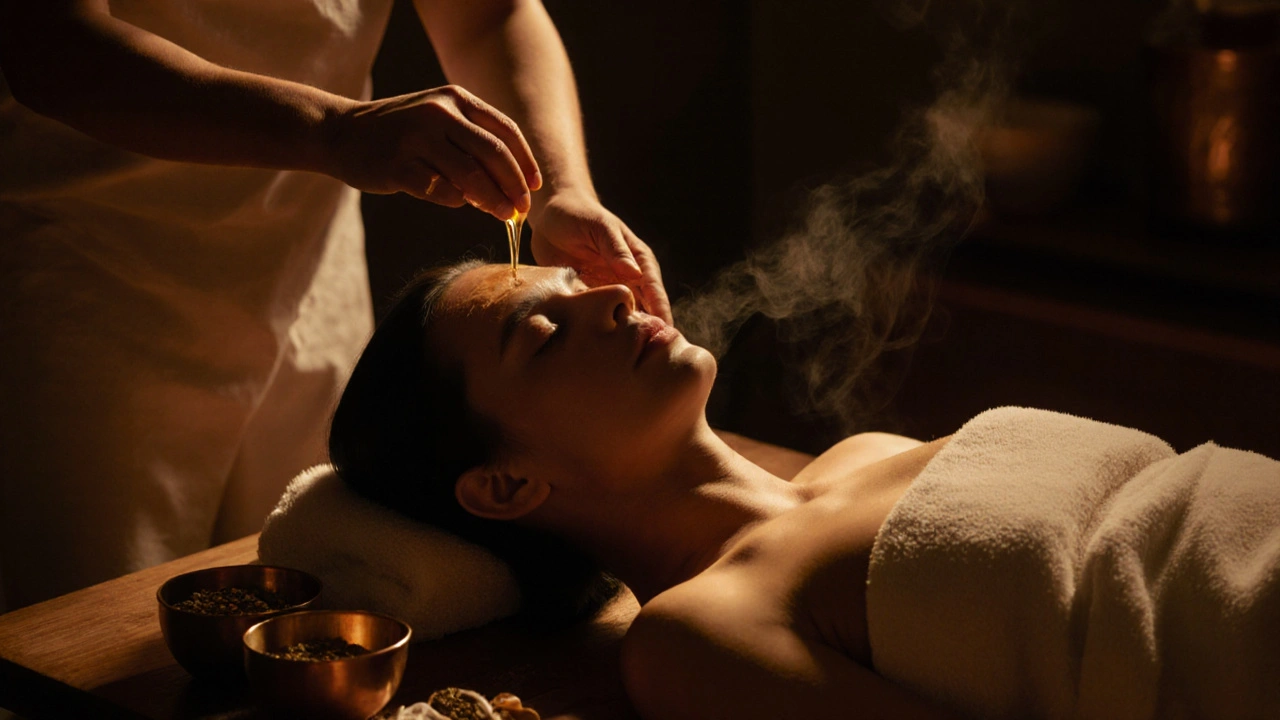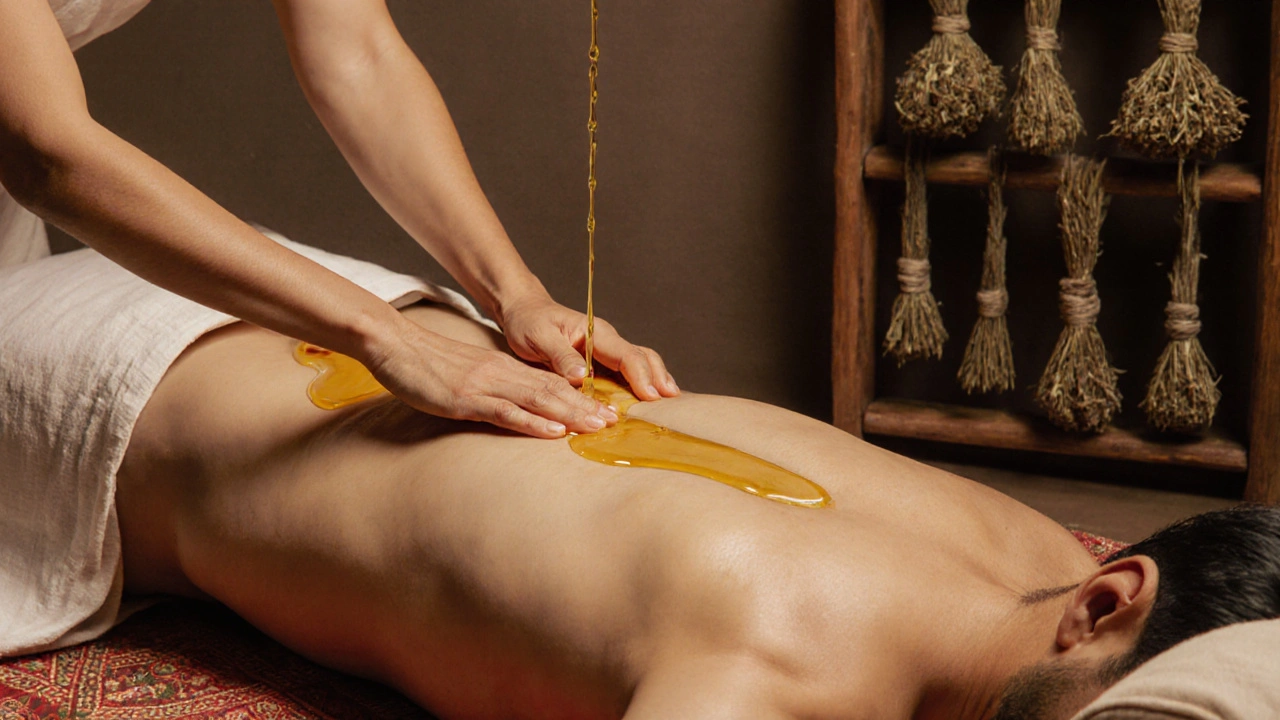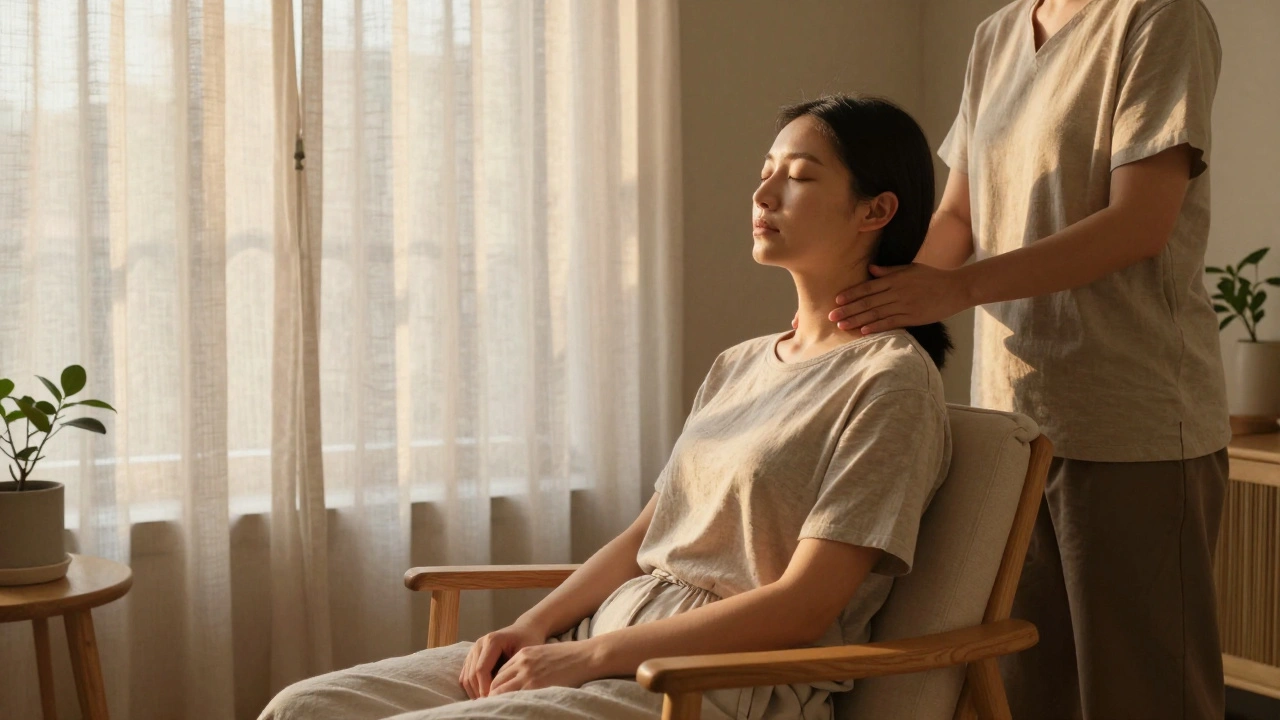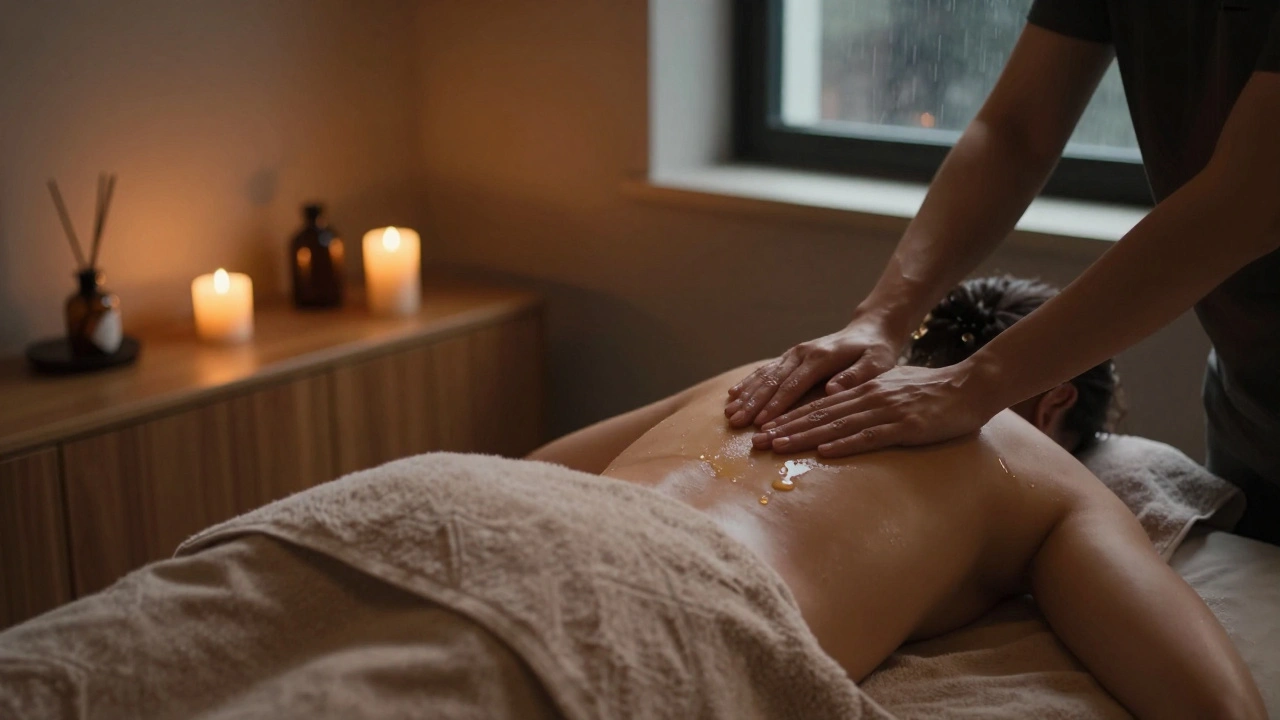Indian massage in London is the ultimate go-to for anyone feeling run down by the city’s relentless pace. It’s more than just a quick escape—it actually tackles stress and aches right where they start. This article covers what makes Indian massage unique, what you can expect during a session, where to find reputable spots in London, and smart tips for squeezing it into your schedule. Whether you need a full reset or just some tension melted away, you’ll find real answers here.

- Created by: Archer Caldwell
- Completed on: 5 Nov 2025
- Categories: Indian Massage
You’ve had a long week. Your shoulders are tight, your mind won’t shut off, and coffee isn’t cutting it anymore. You’ve tried yoga, meditation, even that fancy aromatherapy candle everyone’s posting about. But what if the real secret to unwinding isn’t in a app or a candle-it’s in your hands? Not literally, but in the hands of someone trained in a 5,000-year-old system from India that’s been quietly helping people in London find deep, lasting calm.
Indian massage isn’t just another spa trend. It’s not about oils and ambient music alone. It’s a full-body reset rooted in Ayurveda, the ancient Indian science of life. And in London, where the pace never slows, it’s becoming the go-to fix for people who are tired of surface-level relaxation.
What Exactly Is Indian Massage?
Indian massage, often called Ayurvedic massage, isn’t one single technique-it’s a family of practices built around balancing energy, or doshas. These are the three biological forces in your body: Vata (air and space), Pitta (fire and water), and Kapha (earth and water). When they’re out of sync, stress builds up. Indian massage doesn’t just rub your muscles-it reprograms your nervous system.
Therapists use warm herbal oils-like sesame, coconut, or mustard-infused with turmeric, ashwagandha, or neem. These aren’t just for scent. They’re chosen based on your body type and what’s causing your tension. A Vata-dominant person (someone prone to anxiety, insomnia, or dry skin) gets a slow, grounding massage. A Pitta type (overachiever, prone to anger or inflammation) gets cooler oils and lighter pressure. It’s personalized medicine, but with hands.
Unlike Swedish massage, which glides, or deep tissue, which digs, Indian massage moves in rhythmic, circular strokes. It’s like waves lapping at a shore-constant, soothing, and deeply rhythmic. The pressure builds gradually. You don’t feel it all at once. You feel it sink in.
Why It Works Better Than Other Massages for Stress
Most massages target muscles. Indian massage targets the nervous system. And that’s the difference between feeling good for an hour and feeling calm for days.
Here’s what science says: a 2023 study in the Journal of Ayurveda and Integrative Medicine found that participants who received weekly Ayurvedic massage for eight weeks showed a 34% drop in cortisol levels-the main stress hormone. That’s more than yoga, more than meditation, and on par with clinical therapy. The oils penetrate the skin, reduce inflammation, and trigger the parasympathetic nervous system-the part that says, “You’re safe now.”
Think of it this way: when you’re stressed, your body is stuck in fight-or-flight. Indian massage doesn’t just tell your body to chill out. It rewires the signal. Your heart rate drops. Your breathing slows. Your jaw unclenches. And it doesn’t come back the same way after.
Londoners know this. I’ve talked to nurses from King’s College Hospital, tech workers from Shoreditch, and even a few teachers from Camden who swear by their weekly sessions. One woman, a single mom in Islington, told me: “I used to cry before bed. Now I sleep through the night. I don’t even know why. I just feel… lighter.”
Types of Indian Massage You’ll Find in London
Not all Indian massages are the same. Here’s what’s actually available in London right now:
- Abhyanga: The classic full-body oil massage. Uses warm herbal oils, rhythmic strokes. Best for general stress, insomnia, and fatigue.
- Shirodhara: Warm oil is poured in a steady stream over your forehead. Feels like a liquid hammock for your mind. Used for anxiety, PTSD, and mental overload.
- Pinda Sweda: Bolsters filled with heated rice and herbs are rubbed over the body. Deeply detoxifying. Great for joint pain and chronic tension.
- Garshana: Dry brushing with silk gloves. Stimulates lymphatic flow. Often paired with Abhyanga for a full detox.
- Head and Neck Massage: Focused on Marma points-energy junctions in the scalp, temples, and neck. Instantly calms the mind. Popular among office workers.
Most places offer Abhyanga as the base. Shirodhara is the premium experience-it’s not cheap, but if you’re burned out, it’s worth it. I’ve seen people leave Shirodhara sessions in tears-not from pain, but from relief. Like they’d been holding their breath for years.
Where to Find Authentic Indian Massage in London
You don’t need to go to a fancy spa. Some of the best Indian massage therapists work out of quiet studios in Southall, Wembley, or even private homes in Brixton. Look for places that mention Ayurveda, not just “Indian oils.”
Here’s where to start:
- AyurVeda Centre (Harrow): Run by a therapist trained in Kerala. Uses oils imported from India. Book ahead-she’s got a six-week waitlist.
- Green Lotus Wellness (Camden): Offers Abhyanga and Shirodhara. Uses organic, cold-pressed oils. Great for first-timers.
- Chennai Ayurveda (Southall): Family-run since 1998. Therapists are from Tamil Nadu. Authentic, no frills, just results.
- Marma Points Studio (Notting Hill): Focuses on head and neck work. Perfect for desk workers. Sessions start at £55.
Check Google reviews for mentions of “oil quality,” “therapist training,” and “felt relaxed for days.” If they just say “relaxing,” move on. That’s not Indian massage-that’s just a nice rubdown.

What to Expect During Your First Session
You’ll walk into a quiet room. No loud music. No candles burning in your face. Just soft lighting and the smell of warm herbs.
The therapist will ask you a few questions: How’s your sleep? Do you get headaches? Are you cold or hot most of the time? Then they’ll pick your oil. You’ll undress (you’re covered with towels) and lie on a warm table. The massage starts at your feet-slow, circular motions. Then up your legs, back, arms, neck, and finally your head.
It’s not ticklish. It’s not intense. It’s… deep. Like someone’s pulling the tension out of your bones. You might feel sleepy. Or emotional. That’s normal. Your body’s releasing stored stress.
Afterward, you’ll rest for 15 minutes under a blanket. No phone. No talking. Just stillness. Then you’ll get warm herbal tea. And you’ll realize-you haven’t felt this calm since you were a kid.
How Much Does It Cost? Is It Worth It?
Prices in London vary, but here’s the real breakdown:
| Type | Duration | Price Range | Best For |
|---|---|---|---|
| Abhyanga (Full Body) | 60 minutes | £70-£95 | General stress, fatigue |
| Shirodhara | 45 minutes | £110-£140 | Anxiety, mental burnout |
| Head & Neck Only | 30 minutes | £55-£70 | Desk workers, migraines |
| Combo: Abhyanga + Shirodhara | 90 minutes | £160-£190 | Chronic stress, recovery |
It’s more than a massage-it’s preventative healthcare. If you spend £50 a week on coffee, takeout, or gym memberships, this is the one that actually fixes the root of your stress. One session won’t change your life. But three? That’s when the shift happens.
What to Avoid
Not every place calling itself “Indian massage” is legit. Here’s how to spot the fakes:
- No oil? No Ayurveda. If they use regular coconut oil or don’t mention herbs, they’re just doing a regular massage.
- Too cheap. £30 for a full body? That’s not Indian massage. That’s a student practicing. It’s fine if you’re on a budget, but know what you’re getting.
- No consultation. A real therapist asks about your sleep, digestion, mood. If they just start rubbing, walk out.
- Too many locations. Chains like “Spa India” with 10 branches? They’re selling packages, not healing.
Authenticity matters. The oils, the technique, the intention-it all adds up.

Indian Massage vs. Swedish Massage in London
Here’s the real comparison:
| Feature | Indian Massage | Swedish Massage |
|---|---|---|
| Origin | Ayurveda, India (5,000+ years) | Sweden (18th century) |
| Oil Used | Herbal, warm, personalized | Basic almond or coconut, generic |
| Pressure | Gradual, rhythmic, deep | Light to medium, flowing |
| Focus | Nervous system, energy balance | Muscles, circulation |
| After Effects | Days of calm, better sleep | Hours of relaxation |
| Best For | Chronic stress, anxiety, burnout | Post-workout, general tension |
Swedish massage feels nice. Indian massage feels like you’ve been given back your peace.
Frequently Asked Questions
Is Indian massage safe for everyone?
Yes, if done right. Pregnant women, people with skin conditions, or those on blood thinners should tell their therapist beforehand. Most Ayurvedic centers will adjust the oils and pressure. But avoid it if you have open wounds, fever, or recent surgery. Always ask for a consultation first.
How often should I get an Indian massage?
For stress relief, once a week for 4-6 weeks gives the best results. After that, every two weeks or monthly works as maintenance. Think of it like brushing your teeth-regular care prevents bigger problems. If you’re in a high-stress job, don’t wait until you’re burned out.
Do I need to shower after?
No. In fact, it’s better not to. The oils keep working for hours. Most places give you a towel to wipe off excess. Wait at least 2-3 hours before showering. Some people even sleep in the oil-it’s that gentle. If you’re worried about clothes, wear loose, dark clothing after.
Can I do Indian massage at home?
You can try, but it’s not the same. The rhythm, the pressure, the warmth of the oil-it takes training. You can use Ayurvedic oils for self-massage, especially on your feet or head. But full-body Abhyanga? That’s something you need to receive. It’s not just technique-it’s energy transfer.
What’s the difference between Indian and Thai massage?
Thai massage is more active-it’s like yoga with pressure points. You stay dressed, and the therapist moves your body into stretches. Indian massage is passive-you lie still while oil and rhythm do the work. Thai is energizing. Indian is calming. They’re both great, but for different needs.
Ready to Feel Different?
You don’t need another app. Another supplement. Another weekend getaway. You just need one hour-where someone uses hands older than your city to help you remember what calm feels like.
Book your first session. Pick a quiet studio. Tell them you’re stressed. Let them choose the oil. Lie down. Breathe. And for once, don’t check your phone.
London moves fast. But your body? It remembers how to rest. You just have to let it.
Indian head massages work by reducing stress, easing tension headaches, and improving scalp circulation. Used for centuries in Ayurveda, they’re a quick, effective way to reset your nervous system - especially in busy cities like London.
Discover how a full body massage in London can melt stress, ease chronic tension, and restore inner calm. Learn types, pricing, what to expect, and how to find the best therapists near you.




Helen Chambers
November 5, 2025 AT 16:58OMG I tried Shirodhara last week and I cried for 20 minutes after 😭 I didn’t even know I was holding that much tension. My therapist said my third eye was screaming. Now I nap like a baby. London needs more of this. 🙏✨
Devon Rooney
November 7, 2025 AT 00:56The physiological mechanism here is fascinating. The penetration of lipophilic phytochemicals-curcumin, withanolides, and flavonoids-from Ayurvedic oils into the dermal layer activates PPAR-γ receptors, downregulating pro-inflammatory cytokines like IL-6 and TNF-α. Coupled with vagal stimulation via rhythmic pressure, this explains the 34% cortisol reduction cited in the 2023 study. This isn’t spa pseudoscience-it’s neuroendocrinology with cultural specificity.
For practitioners: ensure oil extraction is cold-pressed and sourced from certified organic farms in Kerala or Tamil Nadu. Adulteration with mineral oils nullifies bioactivity.
Rob e
November 7, 2025 AT 06:175000-year-old? Really? Sounds like marketing fluff. My cousin in Bangalore uses coconut oil and a rubber scraper and calls it ‘Ayurveda.’ Also, why is this only in London? If it’s so magical, why aren’t Indians running to these £140 sessions? They’re too busy working 12-hour days.
Also, why do these places always smell like old curry? 🤢
Ajay Kumar
November 8, 2025 AT 06:58As someone from Chennai who trained in Ayurveda in Thrissur, I can say this is mostly accurate. But many London studios miss the point-they focus on oil and pressure but skip the pranayama and diet advice that makes it work. The massage is just one part.
Also, Abhyanga is not for everyone. If you have high Pitta (red skin, anger, acid reflux), too much warm oil can make things worse. Always get dosha checked first. And yes, don’t shower for 3 hours. The oil is medicine, not grease.
And please, stop calling it ‘Indian massage.’ It’s Ayurvedic. India has 29 states. Not all of us use sesame oil.
Caryn Guthrie
November 9, 2025 AT 23:10Okay but why is this only for rich people? I work two jobs and can’t afford £70 for a massage. Meanwhile, my mom in Ohio uses a $12 bottle of coconut oil and rubs her feet for 10 minutes while watching TV. She’s calmer than half these people.
Also, why do these articles always make it sound like you need a guru to feel okay? I’m just tired. Not spiritually broken.
Jenna Carlson
November 11, 2025 AT 21:31lmao why is everyone acting like this is magic? i got a massage from some guy in southall for 40 quid and he just smothered me in oil and played bollywood music. i felt like a fried chicken. also who says ‘dosha’ out loud like that? sounds like a pokemon.
just get a hot bath and sleep. problem solved.
Caleb Avery
November 11, 2025 AT 23:23Let’s be real-this is just another way for foreigners to exoticize our culture while charging $150 for something my grandma did for free in Kerala with a cloth and a spoon. We don’t need fancy studios. We need people to stop acting like Indian traditions are a luxury spa trend for white people in Camden.
Also, if you’re stressed, maybe don’t live in a city that never sleeps? Just saying.
And yes, I’m proud of my heritage-but don’t turn our healing into a Instagram aesthetic. #AyurvedaIsNotAFilter